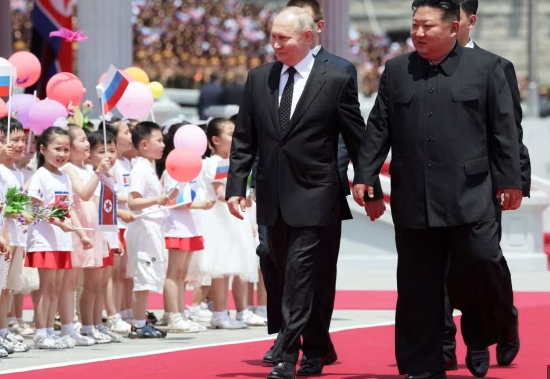Vladimir Putin has announced that Russia and North Korea have elevated their relationship to a “new level,” committing to mutual assistance in the event of an attack, marking a “breakthrough” partnership.
This declaration came during the Russian president’s rare visit to North Korea.
As Putin commenced his first visit to North Korea in 24 years, thousands of North Koreans lined the city’s broad streets, chanting “welcome Putin” and waving Russian and North Korean flags, along with bouquets of flowers.
The visit featured a meticulously arranged display of influence in the authoritarian state.
During the visit, the two leaders signed a new strategic partnership agreement, replacing previous deals from 1961, 2000, and 2001, as reported by Russian state news agency TASS.
He said the deal encompasses the “political, trade, investment, cultural spheres, and the security sphere as well,” calling the pact “truly a breakthrough document.”
Putin said joint drills involving the United States, South Korea and Japan were “hostile” toward North Korea,” characterizing the US policy as “confrontational.”
Kim, meanwhile, called the new “alliance” a “watershed moment in the development of the bilateral relations.”

But the deal between the two autocrats raised many questions, too – including whether Russia’s nuclear deterrent now extends to North Korea, and vice versa, or whether the two nations will now hold joint military drills.
Putin received an enthusiastic welcome during a ceremony at Kim Il Sung Square in North Korea’s capital, where mounted soldiers, military personnel, and children with balloons cheered under large portraits of both leaders.
They introduced their respective delegations and stood side by side as the Russian national anthem played. Later, they rode together in an open-top limousine, smiling and waving to the crowds.
The event underscored North Korea’s close ties with Moscow and likely served as a reminder to the West of Putin’s enduring influence, despite global criticism following Russia’s invasion of Ukraine in 2022.
The partnership holds significance for Russia as well. While several governments have accused Pyongyang of supplying arms to Moscow during its conflict in Ukraine, both countries have consistently denied these allegations, despite substantial evidence suggesting otherwise.
On Wednesday, Putin gifted Kim an Aurus car during their exchange of presents, as reported by Russian state media. This marks the second time Putin has bestowed this model upon his North Korean counterpart.
Additionally, Putin’s aide Yuri Ushakov mentioned that the Russian leader also gave Kim a tea set. Ushakov didn’t specify what gifts Putin received but described them as “also good gifts.”
Putin arrived in North Korea early on Wednesday local time, exactly 24 years after his last visit to Pyongyang.
The visit underscores the deepening alignment between the two nations amidst shared hostility towards the West and growing concerns over their enhanced military cooperation on the international stage.
Before their talks commenced, Kim expressed his full support and solidarity with the Russian government, military, and people. He specifically referenced Moscow’s actions in Ukraine, emphasizing their efforts to safeguard sovereignty, safety, and territorial stability.
“Situations continue to be complicated and ever-changing, but I would like to take this opportunity to reiterate that we will continue to strengthen and closely engage in strategic communication with the (Russian) leadership,” Kim added.

North Korean leader Kim Jong Un and Russian President Vladimir Putin exit a welcome ceremony at Kim Il Sung square in Pyongyang on June 19. Gavriil Grigorov/Pool/AFP/Sputnik/Getty Images
Putin hailed the countries’ ties as based on “equality and mutual respect,” and said an expected new bilateral agreement would “form the basis of relations between the two states for many years to come,” according to Russian state agency TASS.
He also added that he hoped Kim would visit Moscow for their next meeting.
The burgeoning relationship has sparked concern in both Seoul and Washington, not only over North Korea’s arms transfers to Russia, but also the prospect of Moscow transferring its superior military technology to aid Pyongyang’s heavily sanctioned weapons program

